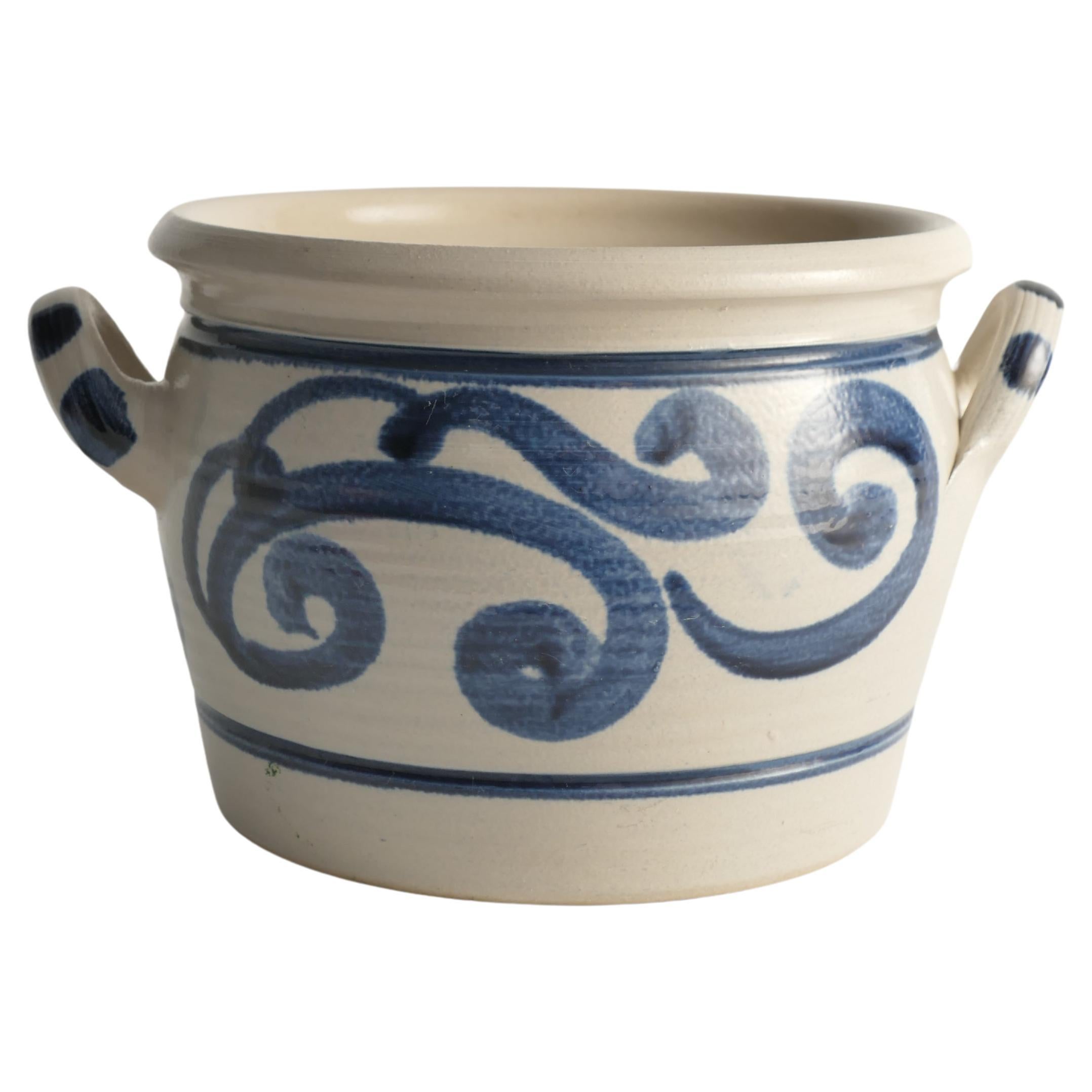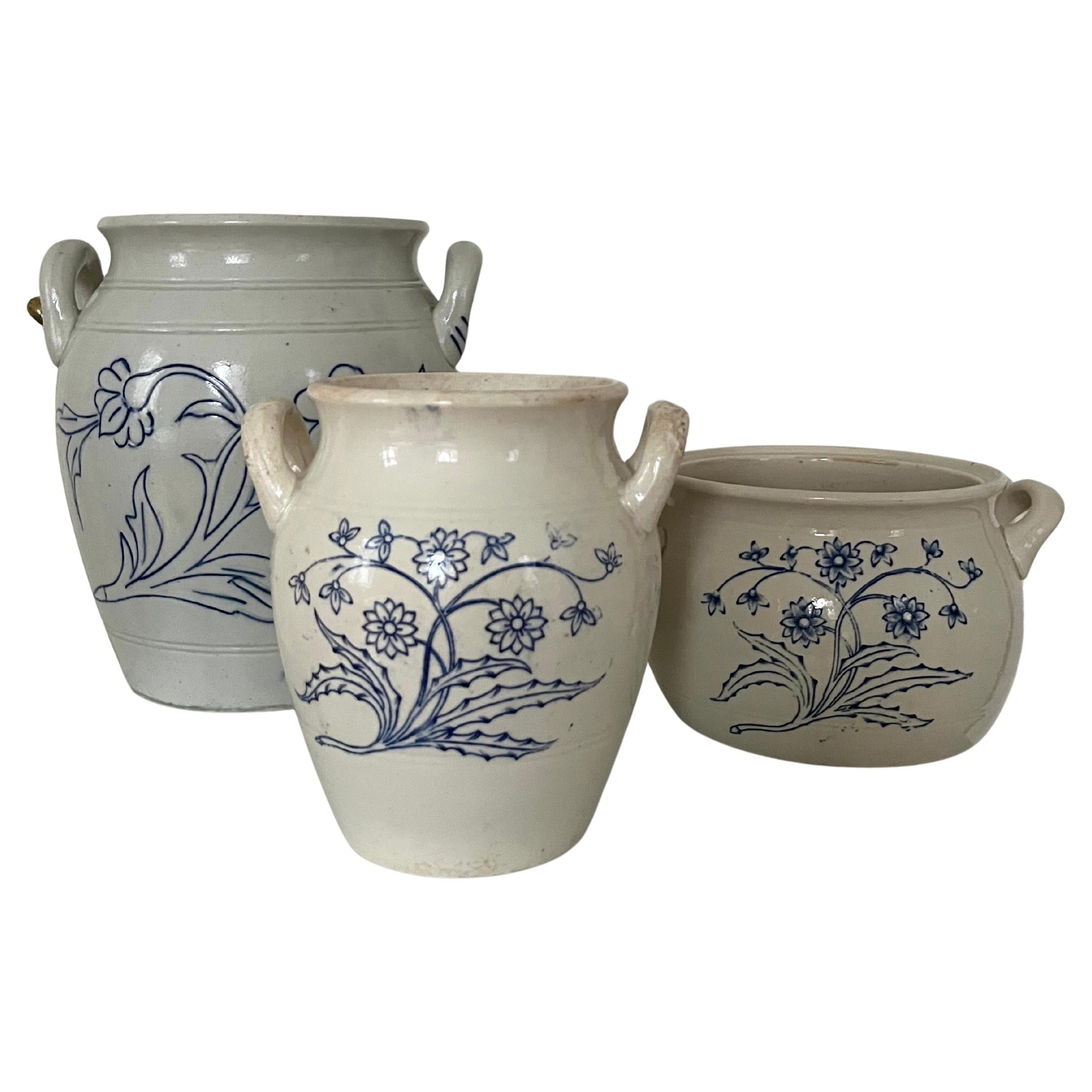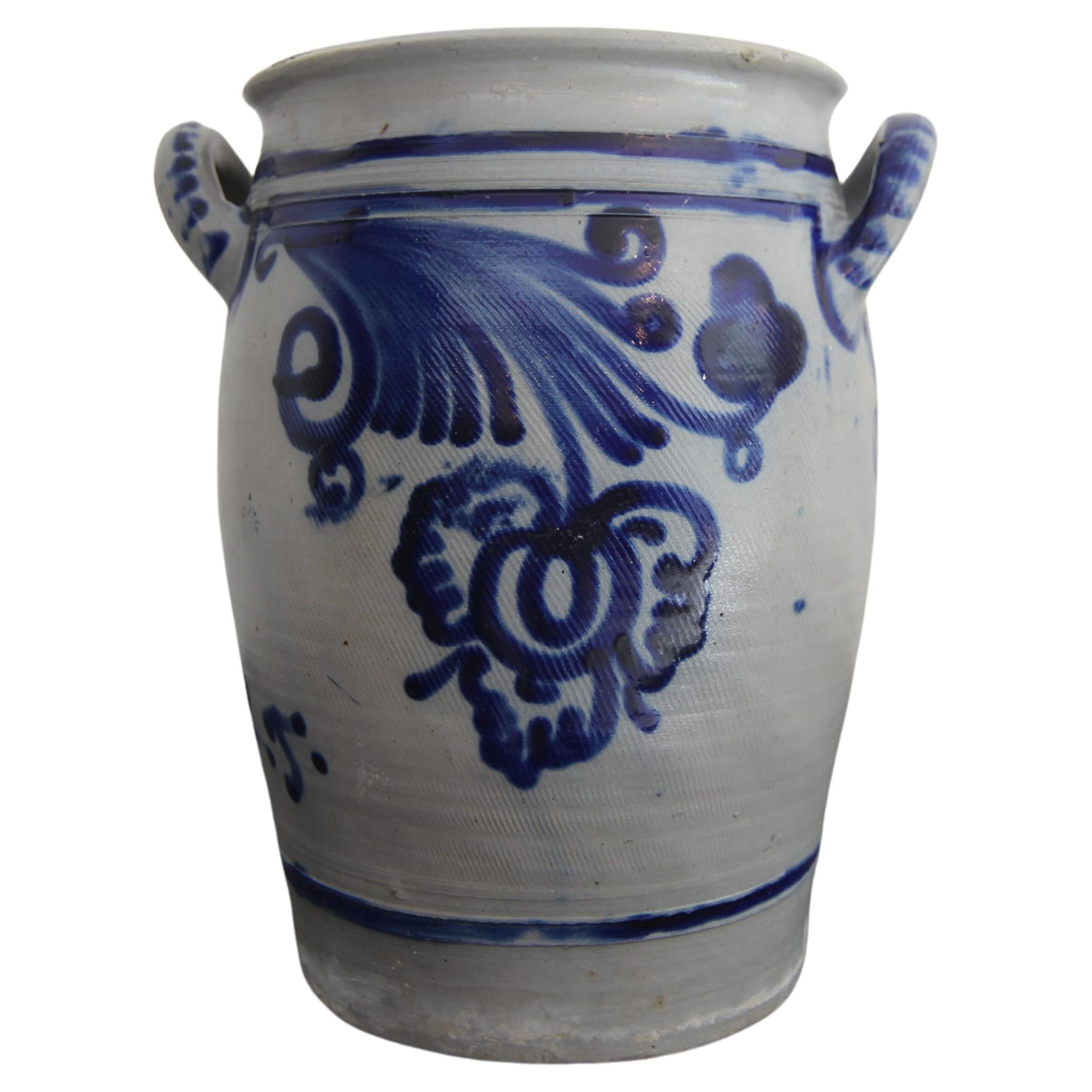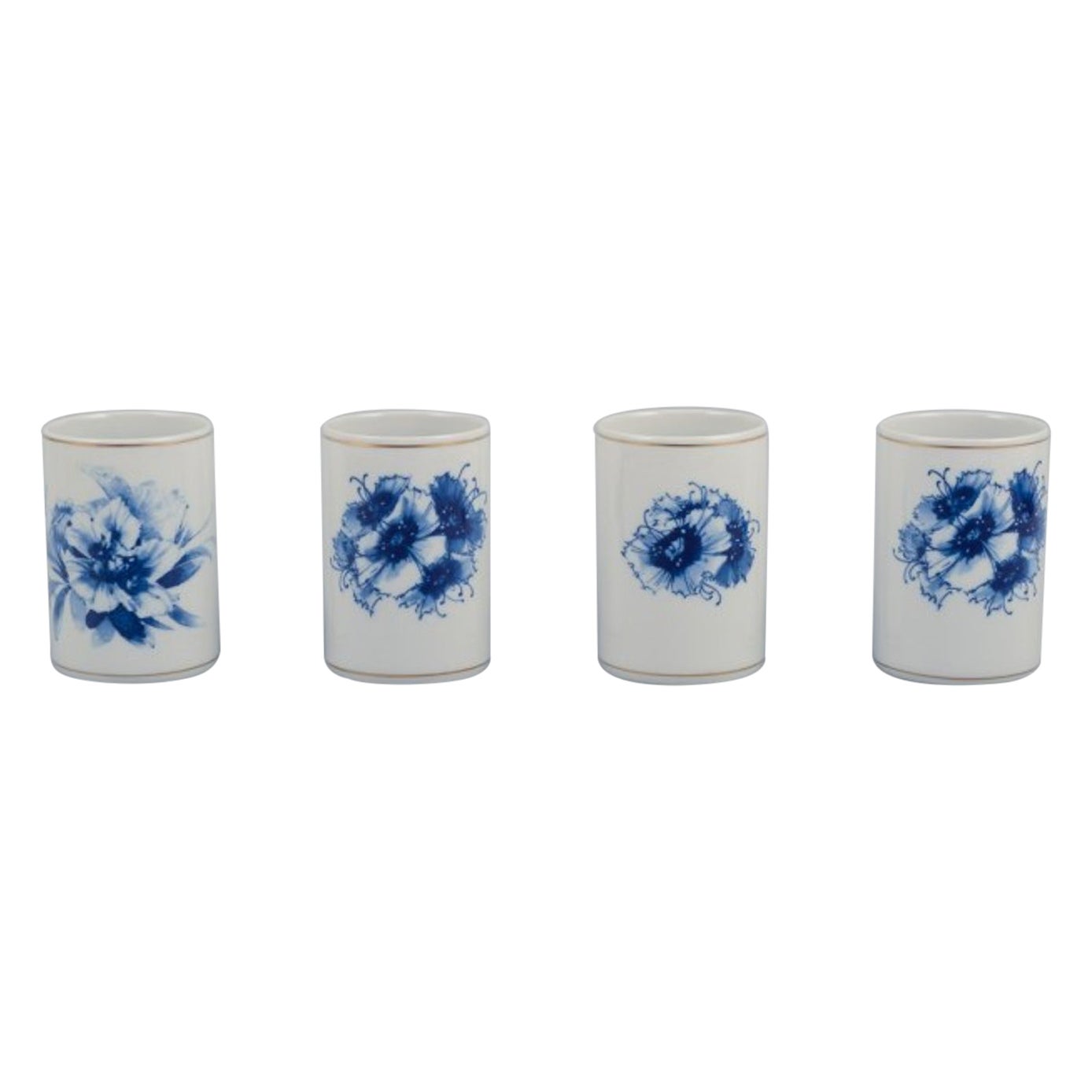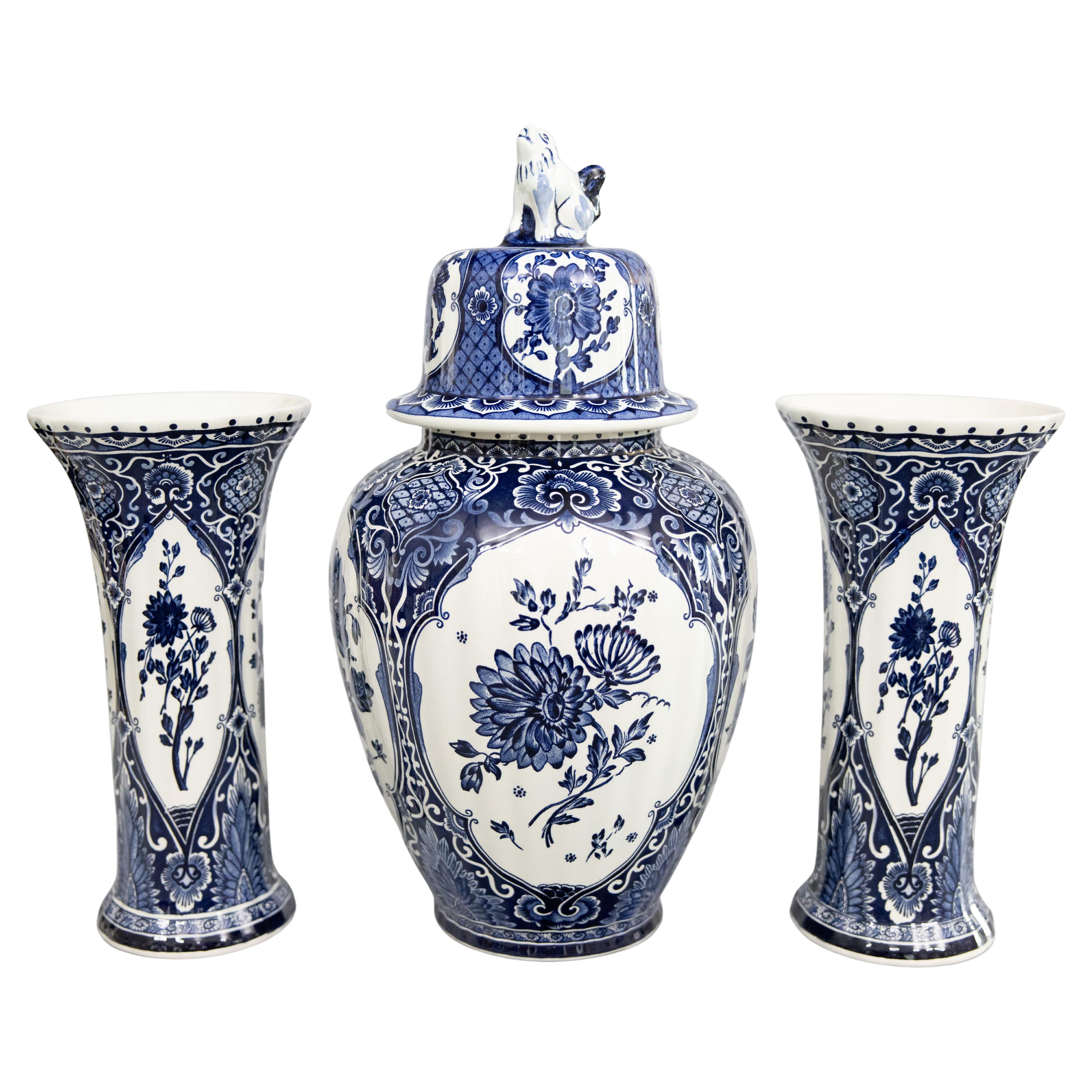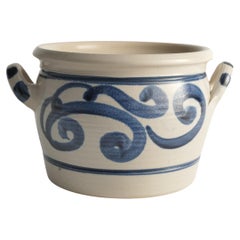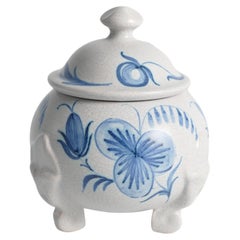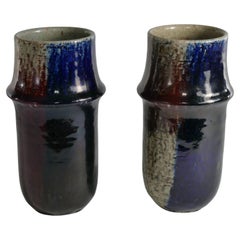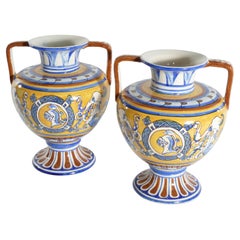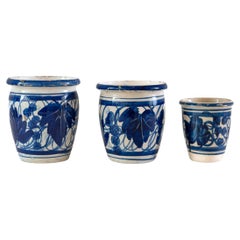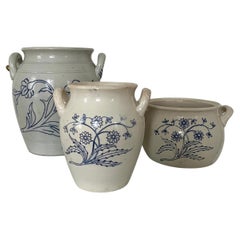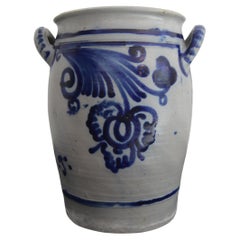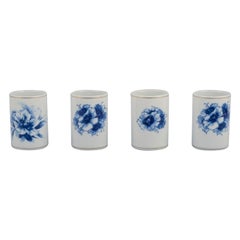Items Similar to Stoneware Jars with Cobalt Blue Floral Motif from Westerwald, Germany, Set of 3
Want more images or videos?
Request additional images or videos from the seller
1 of 11
Stoneware Jars with Cobalt Blue Floral Motif from Westerwald, Germany, Set of 3
$470per set
£358.59per set
€410.07per set
CA$662.33per set
A$722.20per set
CHF 383.26per set
MX$8,731.17per set
NOK 4,850.49per set
SEK 4,446.15per set
DKK 3,062.77per set
About the Item
Crafted in the traditional style of gray pottery adorned with cobalt blue floral motif, these salt-glazed stoneware jars hails from the Westerwald region in Germany with centuries-old tradition of salt glaze stoneware production. With a heritage spanning over 400 years, this handmade jars reflects the region's rich history of craftsmanship. Originally crafted for the purpose of storing and preserving food during winter, this salt-glazed stoneware jars reflects the utilitarian yet artistic essence of traditional German pottery.
One of the two high jars and the wide jar are inscribed underneath with the abbreviation "WW," signifying its origin from Westerwald. "Westerwald" translates to "West Wood" in German. These jars are versatile and can be used for serving food, as a vase, or as a planter.
DIMENSIONS:
Two tall and narrow jars:
Height: 12,5
Diameter: 8,5
One Low and wide jar:
Height: 8,5
Diameter: 11,5
ABOUT WESTERWALD POTTERY
Westerwald pottery, originating from the Westerwaldkreis region in Germany, is renowned for its salt-glazed grey stoneware adorned with cobalt blue designs. This stoneware is renowned for its glossy surface created by the salt glaze. The Westerwald pottery emerged in the late 16th century when potting families from Siegburg and Raeren migrated to the area, bringing their craft. By the 17th century, it gained global popularity, featuring portraits of figures like William III of England and Louis XIV of France. Domestic pieces boasted intricate patterns like rosettes and cherubs. The Keramikmuseum Westerwald showcases its rich history.
- Dimensions:Height: 4.93 in (12.5 cm)Diameter: 3.35 in (8.5 cm)
- Sold As:Set of 3
- Style:Folk Art (Of the Period)
- Materials and Techniques:
- Place of Origin:
- Period:
- Date of Manufacture:Unknown
- Condition:Wear consistent with age and use. The two jars that have the abbreviation "WW" inscribed underneath have the cobalt blue decor bleeding out a bit on a few places, see pictures.
- Seller Location:Grythyttan, SE
- Reference Number:1stDibs: LU8757243060632
About the Seller
5.0
Platinum Seller
Premium sellers with a 4.7+ rating and 24-hour response times
Established in 2015
1stDibs seller since 2023
69 sales on 1stDibs
Typical response time: <1 hour
- ShippingRetrieving quote...Shipping from: Grythyttan, Sweden
- Return Policy
More From This Seller
View AllFolk Art Stoneware Jar with Cobalt Blue Floral Motif from Westerwald, Germany
Located in Grythyttan, SE
Crafted in the traditional style of gray pottery adorned with cobalt blue floral motif, this salt-glazed stoneware jar hails from the Westerwald r...
Category
Vintage 1970s German Folk Art Jars
Materials
Stoneware
Swedish Grace French Blue Floral Decor Bonbonniere by Allan Eberling, Bo Fajans
By Bo Fajans
Located in Grythyttan, SE
This delightful bonbonniere/lidded bowl designed by Allan Ebeling for Bo Fajans, stands gracefully on three curved feet, exuding charm with its globular form. Its light gray hue ado...
Category
Mid-20th Century Swedish Art Deco Decorative Bowls
Materials
Earthenware
$232 Sale Price
31% Off
Scandinavian Modern Ceramic Vases, Sylvia Leuchovius, Rörstrand 1976, Set of 2
By Sylvia Leuchovius, Rörstrand
Located in Grythyttan, SE
This stunning set of 2 vases made of chamotte clay designed by Sylvia Leuchovius, is produced at Rörstrand atelier, signed and dated 1976. From the rare production at Rörstands named...
Category
Vintage 1970s Swedish Scandinavian Modern Vases
Materials
Ceramic, Stoneware
$1,280 Sale Price / set
20% Off
Large Hand-Painted Ceramic Double Handled Vases, France, Set of 2
Located in Grythyttan, SE
A pair of large absolutely stunning French vases with a Mediterranean French Riviera look. Hand-painted decoration of a knight and dragons in the traditional colors of yellow, brown ...
Category
Mid-20th Century French French Provincial Vases
Materials
Ceramic
$1,480 Sale Price / set
56% Off
Satsuma Earthenware Vases, Hand-Painted Polychrome, Japan, Set of 2
Located in Grythyttan, SE
These charming round vases are crafted from yellowish earthenware and feature a polychrome, hand-painted design with ornate designs and figurative pieces with rich, raised gold embel...
Category
Antique Late 19th Century Japanese Meiji Vases
Materials
Earthenware
$768 Sale Price / set
20% Off
Art Nouveau Flower Motif Earthenware Vase by Sala, Sweden 1920s
Located in Grythyttan, SE
This is an absolutely beautiful art nouveau hand-painted and hand-crafted earthenware vase from Sala Kakel- och Keramikfabrik (Tile and Ceramic Factory) made in the early 20th centu...
Category
Vintage 1920s Swedish Art Nouveau Vases
Materials
Earthenware
$408 Sale Price
20% Off
You May Also Like
Set of Three Hand-painted Italian Ceramic Pots late 1800s
Located in Florence, Tuscany
A wonderful set of hand-painted and hand-made ceramic pots from Puglia. The three have been hand-painted with deep blue leaf patterns and are utterly gorgeous. It is very rare to fin...
Category
Antique Early 19th Century Italian Ceramics
Materials
Ceramic
Set of 3 Antique Swedish Stoneware Preserving Jars, Rörstrand & Gustavsberg, c.
By Gustavsberg
Located in Frederiksberg C, DK
Set of 3 Antique Swedish Stoneware Preserving Jars, Rörstrand & Gustavsberg, c. 1900
A beautiful set of three antique Swedish stoneware preserving jars from around 1900, including p...
Category
Antique Early 1900s Swedish Folk Art Pottery
Materials
Stoneware
$1,252 / set
Free Shipping
German Folk Art Grey and Cobalt Blue Stoneware Jar
Located in Dusseldorf, DE
A very decorative German folk art grey stoneware jar with cobalt-blue painting from the 1st half of the 20th century.
Traditional Westerwald stoneware is a type of ceramic ware that was produced in the lower Westerwald and the Kannenbäckerland in the early modern period. Since the 17th century, it has been one of the dominant types of German stoneware. The technique for producing grey stoneware with cobalt blue painting proved...
Category
Early 20th Century German Folk Art Jars
Materials
Stoneware
Meissen, Germany. Four vases. Hand-decorated with blue floral motifs
Located in København, Copenhagen
Meissen, Germany. Four vases.
Hand-decorated with blue floral motifs, gold rim.
Mid-20th century.
Signed.
Perfect condition.
First factory quality.
Dimensions: H 9.5 cm x D 6.5 cm.
Category
Mid-20th Century German Vases
Materials
Porcelain
$280 Sale Price / set
30% Off
Mid-20th Century Dutch Delft Floral Garniture Vases - Set of 3
By Boch Freres Keramis
Located in Pearland, TX
A gorgeous set of three Mid-20th Century Delft transferware garniture vases by Royal Boch (Boch Frères Keramis) in La Louviere, Belgium for Royal Sphinx in Maastricht, the Netherland...
Category
Mid-20th Century Dutch Delft and Faience
Materials
Ceramic
Chinese White and Blue Character and Floral Ginger Jar Vases
Located in Queens, NY
3 Antique Chinese (Early 20th Century) similar porcelain ginger jars with blue floral designs around bold, centered characters and geometric bands leading to unglazed rims (jars vary...
Category
20th Century Chinese Chinese Export Vases
Materials
Porcelain
More Ways To Browse
German Stoneware
Salt Glaze
Salt Glazed
German Stoneware Vase
Germany Blue Glazed
Salt Glaze Stoneware
Cobalt German
Glazed Cobalt Blue Vase
Cobalt Blue Stoneware
Blue Salt Glaze
Westerwald Stoneware
Westerwald Pottery
Blue Salt Glazed Stoneware
Ancient Jar
Antique Delft Tobacco Jar
Antique Wine Jars
Chinese Enamel Ginger Jars
Chinese Neolithic Pottery
